Time and Tides and Sunrise
I wrote my first blog post 13 years ago in February 2008. I launched this site into the digital universe with a soft promise to myself to try to write one post a month. Mostly I was writing in other forms, but I kept this commitment, though on occasion, often in March, I skipped a post. I didn’t read many blogs, didn’t know the impact a blog might have and wasn’t aspiring to master the form—if it even was a form—but I wanted to join the digital world. I’m still not sure what impact this blog has, but I am grateful to those who have read it over the years. Each month I pause and consider what is worth saying in a few hundred words. The discipline of gathering thoughts in actual time once a month has value and has provided a record of sorts.
After this tumultuous year globally with quarantines and isolation and political upheavals in the US and abroad, I am not inclined to words so much as pictures these days, especially of the sunrise each morning, this universal affirmation of the earth spinning in its orbit whatever the sturm and drang of the citizens in its arms.
I found it interesting to review March posts over the years and share a quick snapshot here as a trail of thought and activity. I’ve only copied the opening of each post. You can click the date to read the whole. I hope that they may be of some historical interest and that you enjoy the words and the pictures at the end.
I’m writing this, my second blog, on the birthday of my oldest son and a day when much of the U.S. is watching presidential primary results. I find myself thinking about words, action and change—three concepts that have been debated relentlessly on the airwaves in this U.S. primary season. How do words link to actions that bring about change?
Let me start with my son who spends his days in abstract thought. He is a mathematician, a logician, whose thoughts and work are understood by only a very small number of people around the world. He teaches more accessible math at a university, but his research time is spent thinking and then writing in words and symbols which only a few understand. When I asked him once how his ideas might be applied a hundred years from now, he smiled his patient smile and asked, “Mom, do I ask you how your literature applies?”
All right, I get that. I understand the value of pure ideas, ideas for their own sake. I understand the need to think and to add to the universe of thought even if one doesn’t know the value the thoughts may have and even if they are shared with only a few. It is a way of ordering, discovering and revealing the harmony of the universe….[cont]
March 2009: Cherry Blossoms and Newspapers
Today we are watching actions every day from the new administration. How effective they will be for the economy, for education, for international trade, for peace we all wait to see. But today the means of reporting, investigating, and evaluating these actions are challenged and changing as newspapers around the country struggle to survive.
In the U.S. newspapers are laying off staff, closing bureaus, including their Washington bureaus, and reducing the number of professional journalists who watch and report on the government. Across the globe the print media is challenged. The revolution of the digital age is as transformative as the Industrial Revolution. When one is in the midst of a revolution, it is difficult to know how to adjust and to survive and even flourish; but change is coming, ready or not….[cont]
March 2010: “Because Writers Speak Their Minds—2”
My years as Chair of International PEN’s Writers in Prison Committee began in a way with Salman Rushdie and ended, or at least were framed, by Ken Saro Wiwa. Both were global cases that mobilized writers and others around the world to protest the edicts of governments that tried to stifle dissent and imagination by killing the writer. Rushdie survived; Saro Wiwa did not….[cont]
March 2011: Jury Duty and Revolutions
I spent the month of February on a jury for the first time. I had been called for jury duty at least a dozen times in three or four different cities where I’ve lived, but I was never selected. I assumed because I was a writer and active in human rights work, I was considered a dubious juror. But in February, along with 15 other people, I was empaneled in a criminal case that lasted over a month…
For four weeks all 16 of us arrived every day on time at the courthouse to follow the trial for 6-7 hours. No juror was ever absent and only once or twice was anyone a few minutes late. Everyone took their responsibility to each other and to the court seriously…
Like most people in the jury pool, I was not looking forward to serving and interrupting my life, but I was willing. I was perhaps more willing than usual because I was following the upheavals in the Middle East, particularly in Egypt at the time. The citizens there were protesting for the very freedoms we had in an open democracy, the freedom to participate in government and in one’s justice system. Each day during the breaks many of the jurors followed what was happening in Egypt…had Mubarak resigned yet? It turned out that the people of Egypt overturned a 30-year regime faster than our trial unfolded. When Mubarak finally left office, we were still sitting in the jury box….[cont]
March 2012: Worlds Apart Review
The city is surrounded. Shelling rains down on the population. Sniper fire, bombs, mortars erupt from all directions. There are no safe havens for civilians; dozens are killed each day. The international community meets, protests, debates what should be done. Powerful players like Russia obstruct action. Sanctions are tightened, but it is citizens who suffer most. Outside nations are willing to offer humanitarian aid, but are conflicted about arming the opposition. The UN organizes peacekeeping forces, but the mandate and rules of engagement are unclear. The siege and the deaths continue…for years.
This description could be from today’s headlines in Syria, but instead it is the siege of Sarajevo in Bosnia 20 years ago. The paralysis of the international community to intervene and prevent the killings of citizens is still haunting….[cont]
(My reprinted book review of Ambassador Swanee Hunt’s Worlds Apart.)
March 2013 I didn’t post in March.
March 2014: Women’s Progress: The Power of a Bridge…and a Double Yellow Line
I arrived at Johns Hopkins as a graduate student in the Writing Seminars straight from a small college in the Midwest with a combination of confidence and concern that Hopkins had made a mistake admitting me. I was sure the other students would be more widely read and experienced. I spent the whole spring and summer when I wasn’t working, reading. That fall at Hopkins I was assigned the very first seminar paper focused on a controversial novel at the time The Confessions of Nat Turner by William Styron. The controversy arose around whether a white novelist could or should take on the first person narrative voice of a slave. I’ll get to my answer later in this talk. I got an A on the paper and knew I was going to be all right. Hopkins let me know I could meet the challenge. That was my first lesson.
When I arrived on campus, there were no women undergraduates. At the time my social conscience was focused more on civil rights than women’s rights so while the role of women in the larger society concerned me, I think I viewed the ratio at Hopkins as a social advantage. But here comes my next big lesson. When I had a disappointment on the romantic front and was feeling low, a voice in my head challenged: “If you have time to mope about, you have time to reach out and help someone!” That voice was not echoing my parents; they would be kinder. It was my own voice taking me to task, and so I listened.
I went to the Hopkins Tutoring office and signed up to tutor in the community. I was assigned a family who lived in West Baltimore and later moved to the projects on Druid Hill Ave. One evening a week I drove over to their house and tutored the mother of five children, ages 4-12. She only had an eighth grade education and wanted to read better. I also helped the children with their homework. The 10-year old daughter and I shared the same birthday. I tell you that because I’m still in touch with this family, and recently when the mother and I were talking on the phone after that birthday had passed, she asked me: “Do you know how old I am?” And I answered, yes, you’re ten years older than me and your daughter is ten years younger, and none of us should be counting anymore.” We both laughed. Three of those children went on and graduated from college and the oldest son finished high school and is a grandfather himself now. One of the treasures of my time at Hopkins was getting to know this family and having them part of my life over the years though we don’t see each other as much lately. My Hopkins education opened worlds to me of all kinds, showing me I would be okay in the larger intellectual world as well as in the inner city of Baltimore….[cont]
(From a talk given at Celebration of Women’s Day at Johns Hopkins University)
March 2015 I didn’t post in March.
March 2016: Spring and Release
I saw the first daffodils today…and forsythia…and the buds on cherry blossom trees. Spring with its regalia is starting to blossom, at least here in Washington, DC.
In the freedom of expression community renewal is heralded this week by the release of writers from prison in a number of countries, including Qatar, China and Azerbaijan. While the writers were unjustly imprisoned in the first place and many hundreds still languish in jails because they have offended governing powers, the releases of Qatar poet Mohammed al-Ajami after almost five years in prison and Chinese writers Rao Wenwei and Wang Xiaolu and half a dozen writers in Azerbaijan are cause for quiet celebration….[cont]
March 2017: I didn’t post in March.
March 2018: I didn’t post in March.
March 2019: Arc of History Bending Toward Justice?
PEN International was started modestly almost 100 years ago in 1921 by English writer Catherine Amy Dawson Scott, who, along with fellow writer John Galsworthy and others conceived that if writers from different countries could meet and be welcomed by each other when traveling, a community of fellowship could develop. The time was after World War I. The ability of writers from different countries, languages and cultures to get to know each other had value and might even help reduce tensions and misperceptions, at least among writers of Europe. Not everyone had grand ambitions for the PEN Club, but writers recognized that ideas fueled wars but also were tools for peace….[cont]
March 2020: [Beginning in May, 2019 I began writing a retrospective of work with PEN International for its Centenary so posts were more frequent in 2019-2020.]
March 12, 2020: PEN Journey 21: Helsinki—PEN Reshapes Itself
[PEN International celebrates its Centenary in 2021. I’ve been active in PEN for more than 30 years in various positions and now as an International Vice President Emeritus. With memories stirring and file drawers of documents and correspondence bulging, I am a bit of a walking archive and have been asked by PEN International to write down memories. I hope this personal PEN journey will be of interest.]
In the old days, at least my old days, the Vice Presidents of PEN International sat in a phalanx on a stage while the Assembly of Delegates conducted business—revered writers, mostly white older men, along with the President, International Secretary and Treasurer of PEN in the center. If the Assembly business wore on, it was not unusual to see one or two of them nodding off. The role of the Vice Presidents was to provide continuity—many had been former PEN Presidents—to provide wisdom, contacts and gravitas. The designation was for life.
But times were changing. For instance, I had recently been elected a Vice President. I was a woman. I’d served PEN in several positions, including president of my center, founding board member of the International PEN Foundation and International Writers in Prison chair; I was a writer, though not of international renown, and at the time I was relatively young. I had been nominated by English PEN whose General Secretary thought it was high time more women sat on that stage. I didn’t relish sitting on a stage, but I was honored to hold the position. The Helsinki Congress in 1998 was the first when Vice President was the only role I had. I don’t recall if there was a stage at that Assembly. The fun was that I didn’t have to do anything. I could float between committee meetings, offer comments when relevant, wisdom if I had any and be called upon for whatever insight or experience or task might serve…
At the 65th PEN Helsinki Congress held at the Marina Conference Center on the waterfront, a short walk from the city center, delegates and PEN members from 70 centers around the world gathered. The Congress’ theme was Freedom and Indifference….[cont]
March 26, 2020: PEN Journey 22: Warsaw—Farewell to the 20th Century
Bombs had been falling for months on Serbia when the 66th PEN Congress convened in Warsaw June 1999. The NATO assault—one of the last major campaigns of the Balkans War—ended just a week before the Congress opened. These events stirred debate at the Congress whose theme Farewell to the 20th Century caused delegates to look back as well as forward in deliberations.
The past included Warsaw’s history as well as its proximity (and a post-Congress trip) to Kraków and to the concentration camps of Auschwitz and Birkenau. I didn’t join the PEN trip, but during the Congress, I went on my own one day to these memorials of World War II’s terrible past so that I could walk and think alone among the empty crowded bunks, the piles of shoes, the ovens…
The Warsaw Congress was my first trip to Poland though not my last and my first visit to a concentration camp, though not my last.
The wars of the 20th Century both past and current were a problematic platform upon which to launch into the new Millennium, yet the century also was a time of citizens coming together and speaking out in such organizations as PEN….[cont]
March 31, 2020: The Journey of Liu Xiaobo: From Dark Horse to Nobel Laureate
A zoo in China placed a big hairy Tibetan mastiff in a cage and tried to pass if off as an African lion. But a boy and his mother heard the animal bark, not roar. As news spread, the zoo’s visitors grew angry. “The zoo is absolutely trying to cheat us. They are trying to disguise dogs as lions!” declared the mother.1
In 2009 the Chinese government put Liu Xiaobo, celebrated poet, essayist, critic, activist, and thinker into a cage, labeled him “enemy of the state,” charged him with “inciting subversion of state power,” and sentenced him to eleven years’ imprisonment. Liu Xiaobo was not an enemy, but he was a “lion” the state feared. He challenged orthodoxy and conventional thinking in literature, which he wrote and taught, and authoritarian politics, which he protested and tried to help reshape. His insistence on individual liberty in more than a thousand essays and eighteen books, his relentless pursuit of ideas, including as a drafter and organizer of Charter 08, which set out a democratic vision for China through nonviolent change, and finally his last statement, “I have no enemies and no hatred,” threatened the Chinese Communist Party and government in a way few other citizens had.
Dr. Liu Xiaobo was the first Chinese citizen to win the Nobel Prize for Peace, in 2010, but he was in prison, was not allowed to attend the ceremony, and died in custody in July 2017….[cont]
(My essay from The Journey of Liu Xiaobo: From Dark Horse to Nobel Laureate, ed. Joanne Leedom-Ackerman with Yu Zhang, Jie Li, and Tienchi Martin-Liao)
Sunrises on Maryland’s Eastern Shore:
The earth keeps spinning, showing us her beauty…
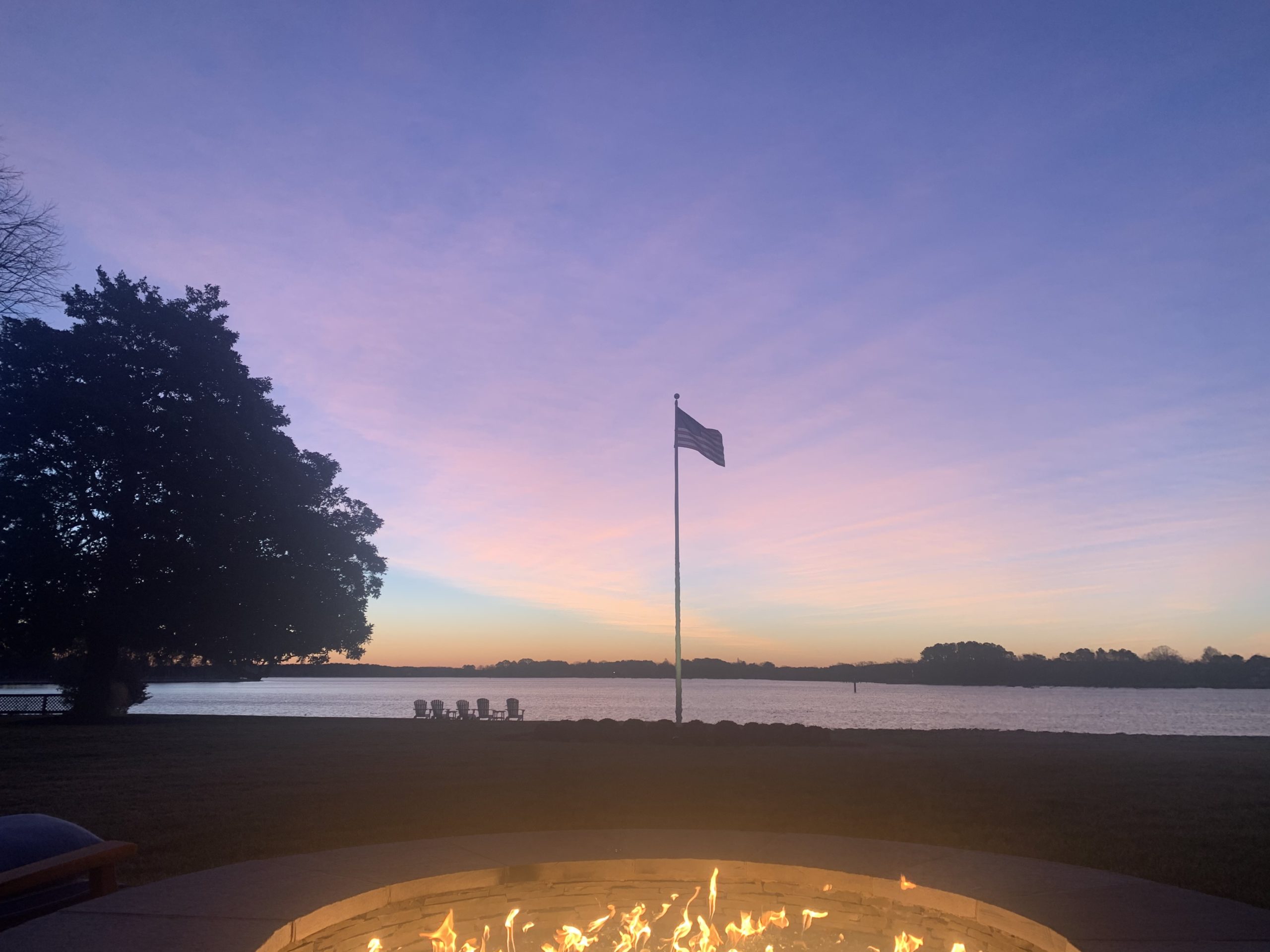
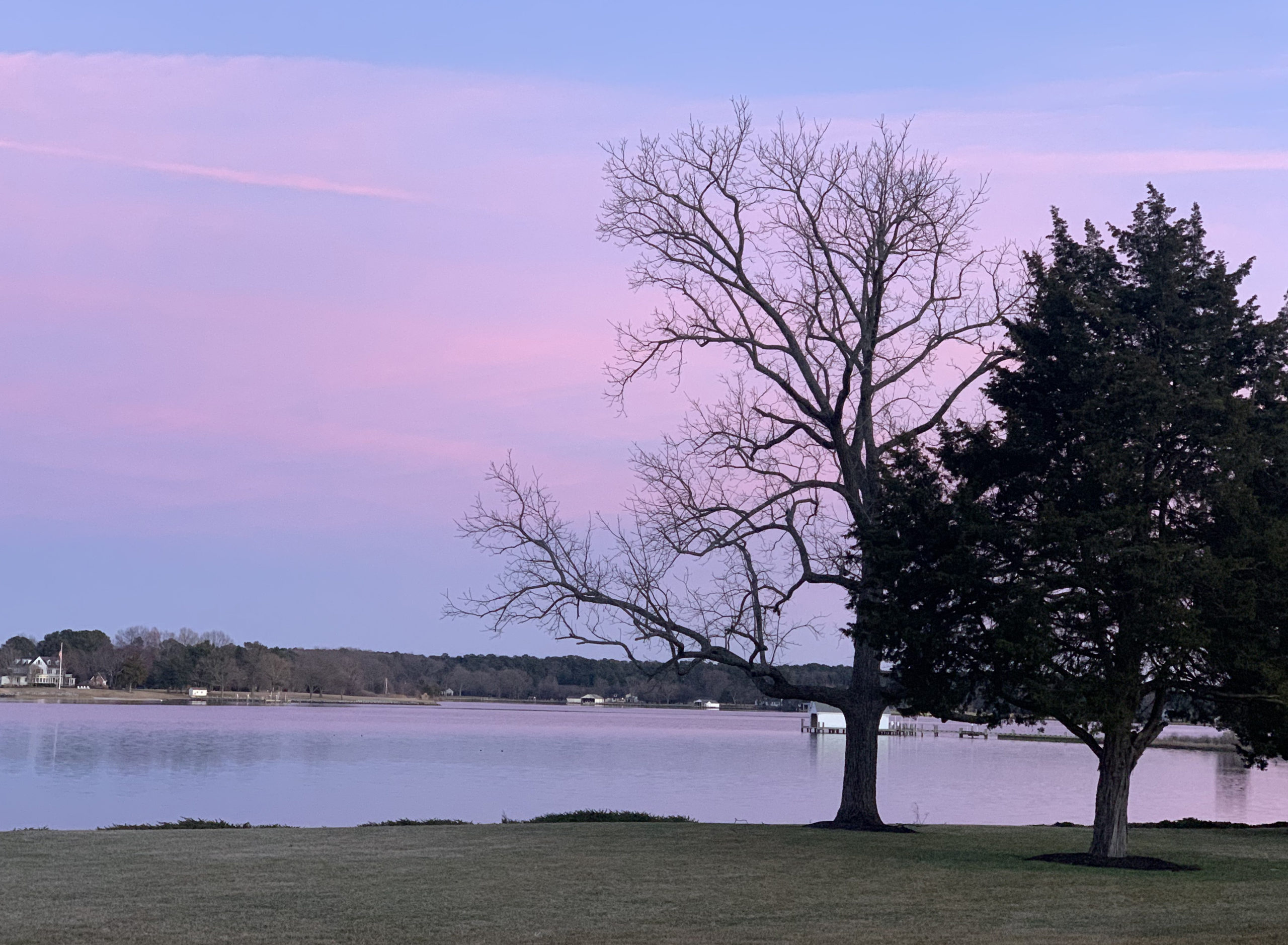
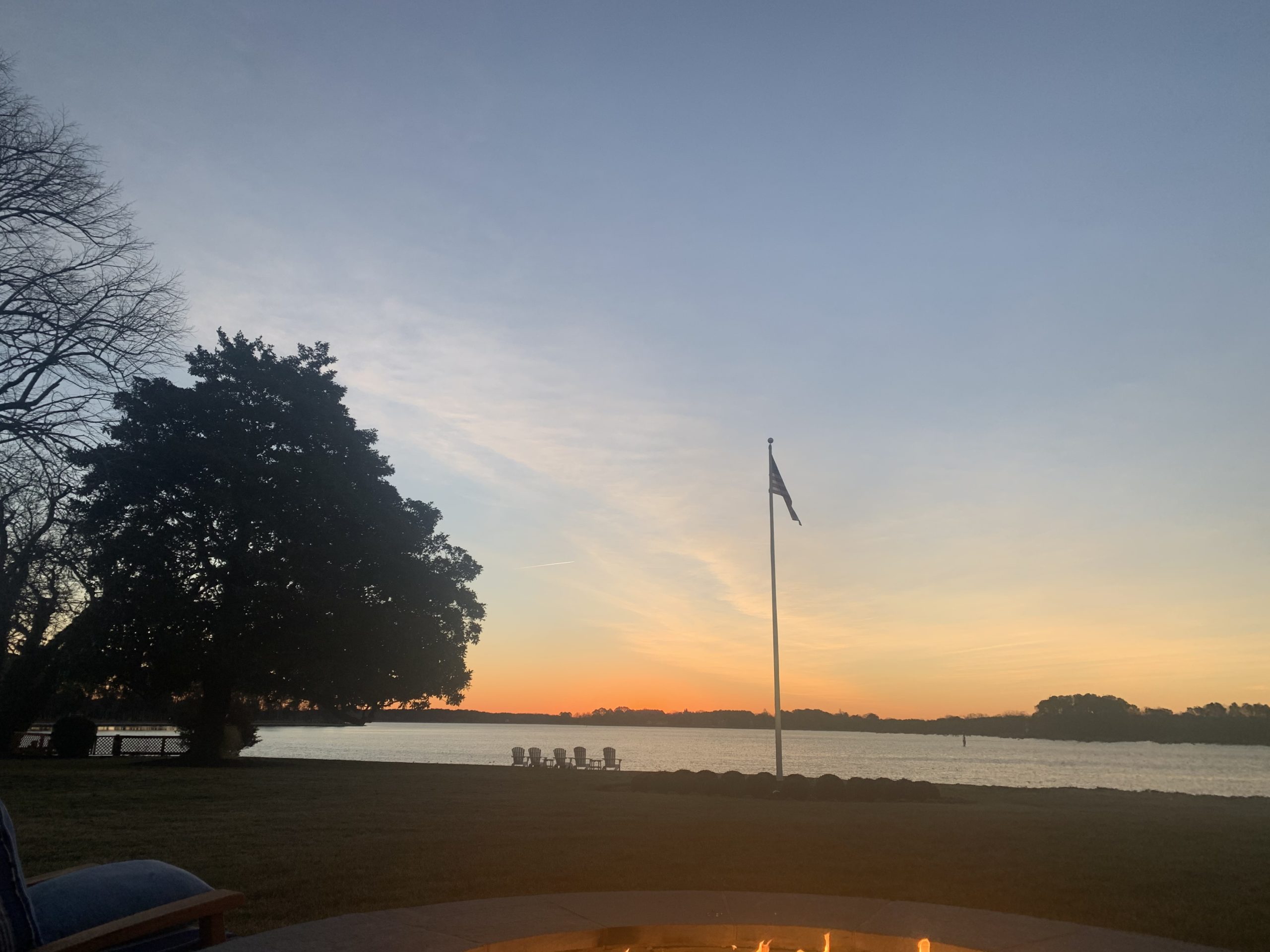
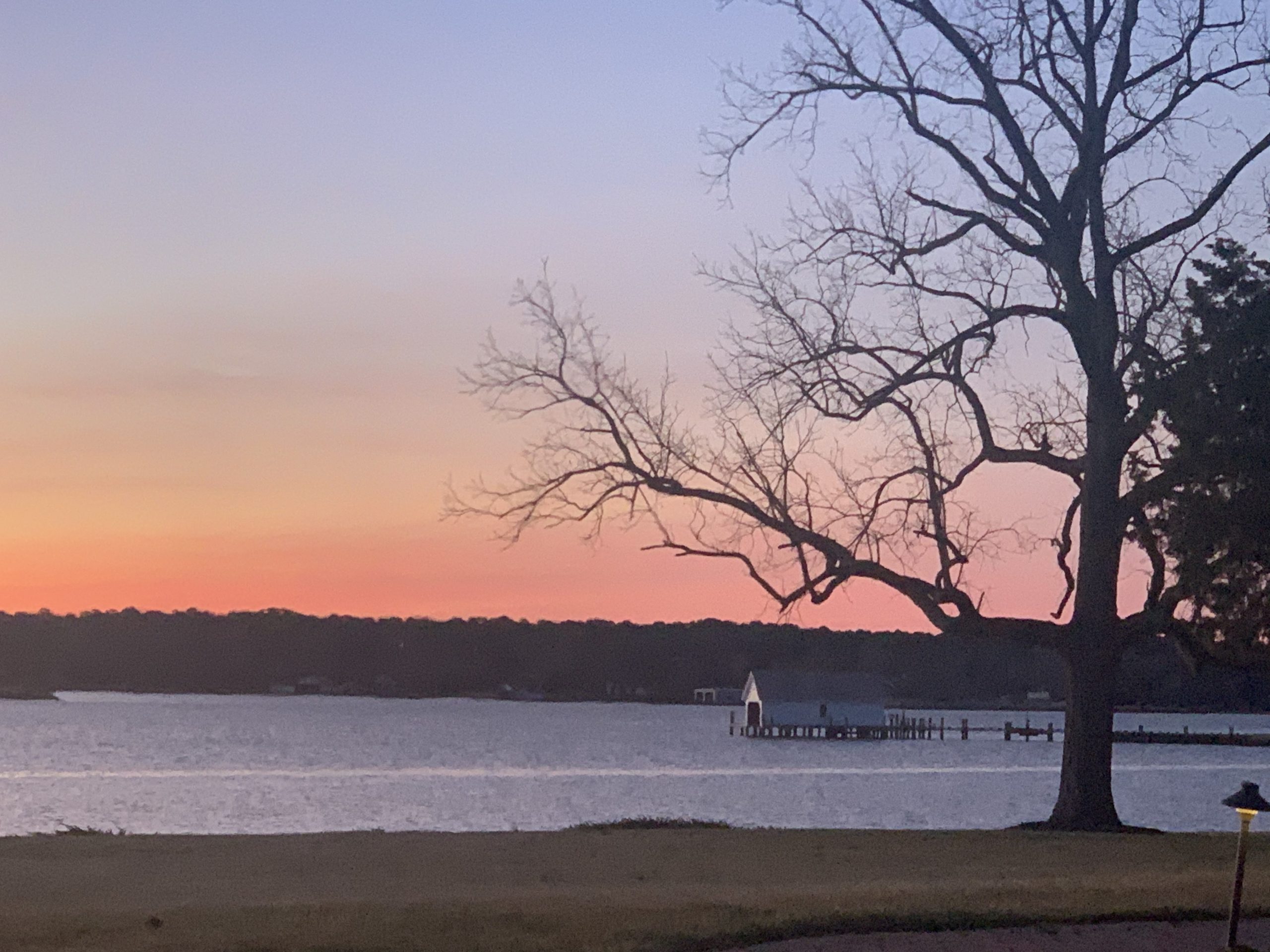
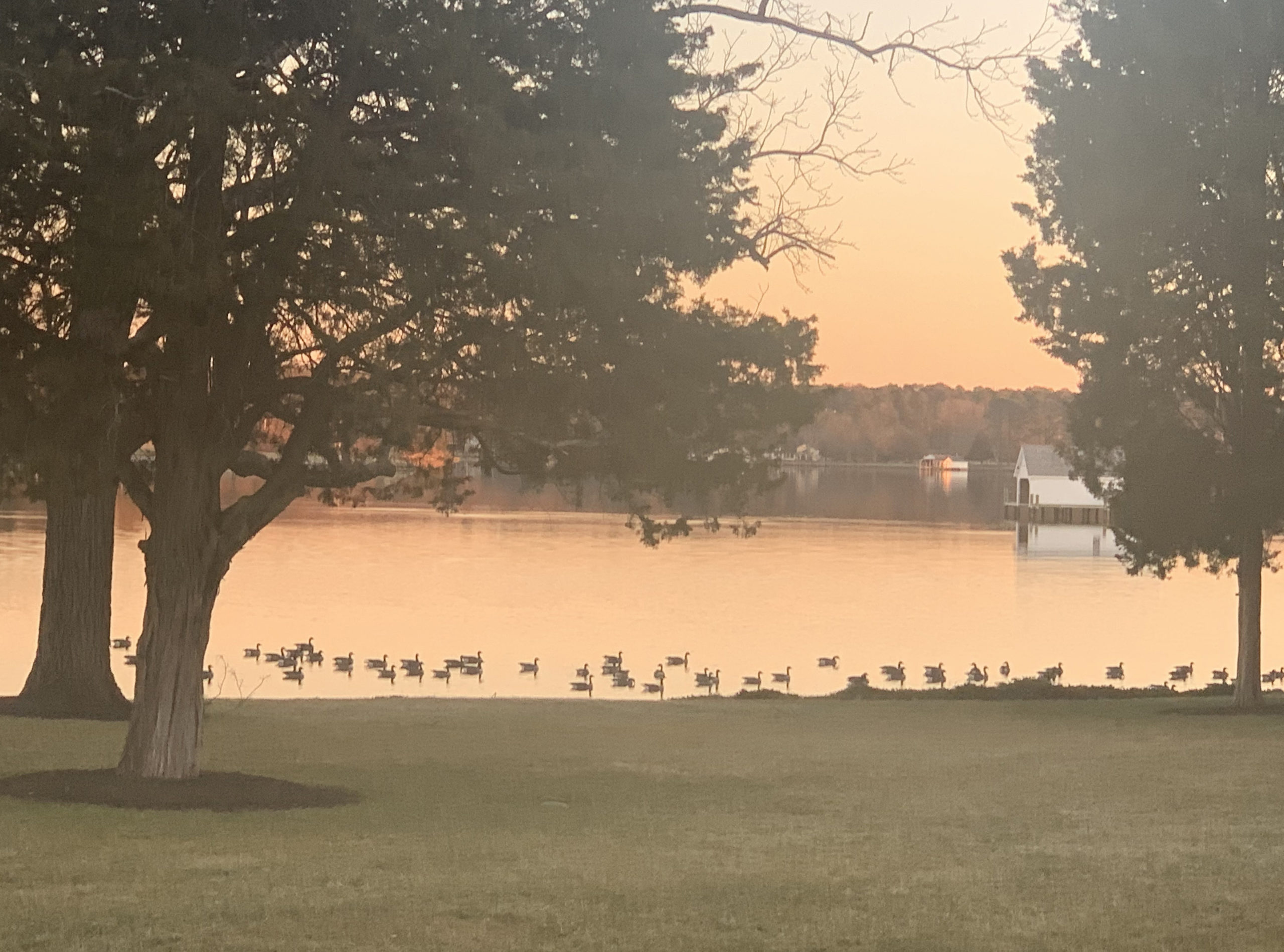
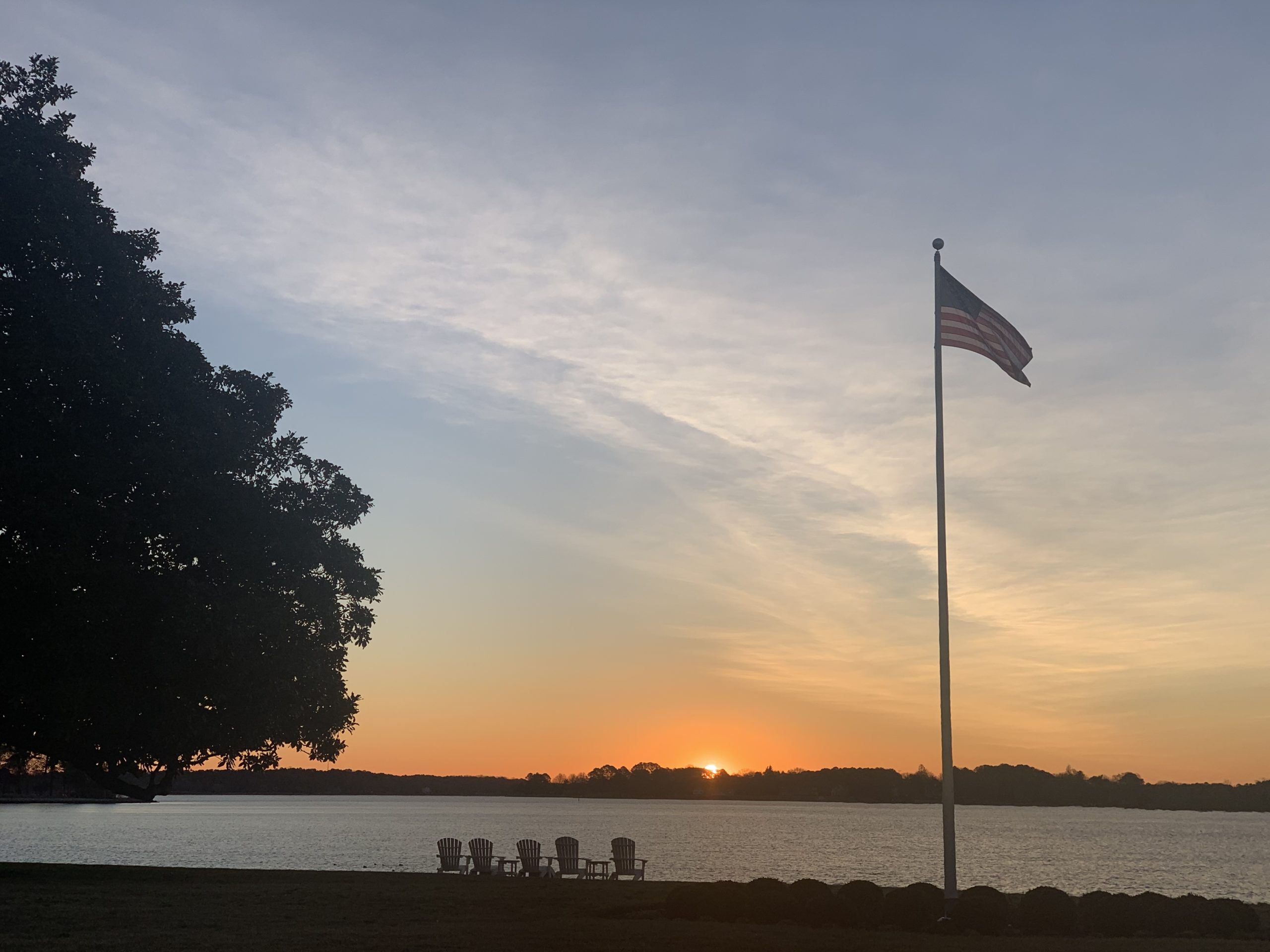
Photo credits: Joanne Leedom-Ackerman
Thank you for sharing your blog and photos. PEN allows us to cross oceans while holding hopeful hands. I too have a blog and if you care you may see what I have written about Pen and other subjects. with many thanks and best wishes.
Yes, I’d love to see your blog too on PEN. You can email me at jlajoanne@aol.com to give me the link. Thanks for reading and responding to this one.
What a pleasure to read you, Joanne!
I once published in a literary magazine in Quebec a paragraph from the 15th of September entry for about a dozen years of my ‘Carnets’ which I’ve been writing for 32 years now. The ideal combination of irrelevant facts or feelings, images or chatter. Seen from above, though, it is like the spots of pastel painting on a Seurat. Imagine the fuzziness of the landscape in 22,500 pages.
Of the five chairs by the water, I’d like to use the second from the right, some day. Please.
hugs from afar and two metres
é.
Okay, second chair from the right! 22,500 pages! Curious what the full Seurat painting depicts of a life interestingly lived.
Thank you so much for this record of your blog posts. What an interesting way to take stock of the years since you started sharing your thoughts via a blog. I like the photos too!
Thank you, Kathy, especially for being a loyal and responsive reader!
“I have no enemies and no hatred.” How wonderful if we could all end our days with words like these! Somehow it seems fitting to finish your 13 year blog survey with the announcement of your book on Liu Xiaobo. Wishing you well, Joanne.
Yes, “I have no enemies and no hatred” is to be wished and particularly inspiring given the confrontations he had and the values Liu Xiaobo stood for.
Joanne, Thank you for this post. It is a joy- and relief- to read your clearly articulated, gracious thoughts. Your journey through time prompted me to remember where my thoughts were at that same time – easiest around political and social issues.
I loved the option of being able to link with the original blog. It was immediate with your jury duty blog. The conclusion was more satisfying than simply learning a verdict. I look forward to reading the others.
Your first post, with your son’s response to value, clarified the purpose of these posts – and the arts.
Your blog posts are anticipated and appreciated!
Thank you, Joanne.
Thank you, Sally. Yes, the jury duty during the Arab Spring is a time I particularly remember. If one is going to spend over a month on jury duty, what a momentous time to spend it!